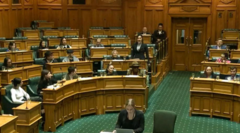The Tiergarten Nürnberg zoo's decision to cull baboons due to overcrowding has sparked backlash, with activists claiming the zoo's breeding policies are to blame, igniting a broader discussion on animal welfare practices in captivity.
Controversy Erupts as German Zoo Culls Healthy Baboons Amid Overcrowding Crisis

Controversy Erupts as German Zoo Culls Healthy Baboons Amid Overcrowding Crisis
The culling of 12 healthy Guinea baboons in Nuremberg has drawn significant public outrage and led to arrests of animal rights activists protesting outside the zoo.
A zoo in Nuremberg, Germany, has come under fire after culling 12 healthy Guinea baboons as a measure against severe overcrowding in their enclosure. The controversial decision culminated in a protest where seven animal rights activists were arrested for illegally entering the zoo grounds. One protester took extreme measures by gluing herself to the ground at the entrance.
The zoo stated that rising numbers had led to increased aggression and conflict among the baboons, and that they were unable to relocate the surplus animals. Christoph Maisack, head of the German Legal Association for Animal Protection Law, criticized the zoo's rationale, claiming that allowing animals to breed should not justify their euthanasia.
Last year, the Nuremberg zoo announced plans to cull some baboons, as their population of over 40 significantly exceeded the capacity of 25 set by a 2009 enclosure. Attempts to implement contraceptive measures had failed, and zoos in other countries that the baboons could have been sent to were also at capacity.
On Tuesday morning, the zoo shut its gates citing "operational reasons," which prompted immediate protest action from demonstrators who jumped the fence. The zoo later revealed that the baboons were humanely shot, checked for research, and the remains were then transferred to the zoo's predatory animals.
Zoo Director Dag Encke defended the actions, emphasizing that the culling decision was made after lengthy contemplation and was deemed a necessary measure for population management according to standards set by the European Association of Zoos and Aquaria (EAZA).
Animal welfare organizations have responded fiercely, filing legal complaints against the zoo for the culling of animals that were deemed healthy. A spokesperson for Pro Wildlife described the culling as "avoidable and illegal," attributing the situation to the zoo's long history of poor breeding practices.
This incident continues a troubling trend in Europe, where other zoos have also faced criticism for similar decisions, such as the high-profile case in 2014 when a giraffe was culled in Copenhagen due to genetic concerns, an event that was streamed live online.





















